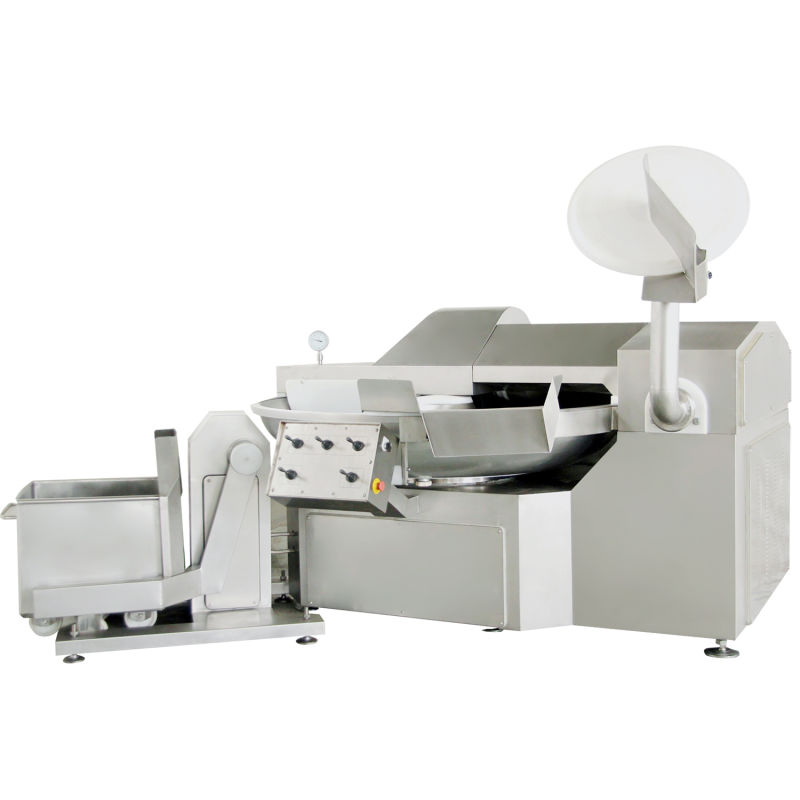PERFORMANCE ADVANTAGES: This machine has two nds of specifications, one is equipped with a hydralic feeding, one is not , all use of variable frequency speed configuration . This variable frequency speed choppe&mix machine is indispensable with dealing Rice-meat dumplings meatballs, fish balls, Taiwan sausage and other meat products . The machine feeding, discharging, open cover are used hydraulic control. Stable operation, high yield, good quality, low temperature. This variable frequency speed chop&mix machine can not only be finally chop meat, fat,such major raw materials,  but also mix other accessories: water, ice, spices and other additives and ingredients into a homogeneous emulsion. The emulsification can greatly enhance the density and elasticity of the product. This variable frequency speed chop&mix machine can choose six shift frequency cutter and Three shift frequency spin pot to meet the requirements of the product within the specified speed by determine the number of revolutions per shift. Food contact parts of the machine are made of 304 stainless steel, easy to operate, stable and reliable. Auxiliary agents, also known as additives, are substances that are added to a material to improve or modify its properties. In the field of polymers, auxiliary agents are commonly used to enhance the processing, performance, and durability of polymer materials. Auxiliary Agent,Liquid Phenolic Resin,Phenolic Resin,Composite Phenolic Epoxy Resin Shanghai Shengduan Trading Co., Ltd. , https://www.sdcuringagent.com
MODEL
JX-ZB40
JX-ZB80
JX-ZB125
JX-ZB200
JX-ZB2330
JX-ZB525
CAPACITY
20-30KG/T
40-50KG/T
100KG/T
180KG/T
300KG/T
500KG/T
VOLUME
40L
80L
125L
200L
330L
525L
POWER
6.25KW
15KW
25.5KW
48.3KW
58.7KW
79.4KW
KNIFE NUMBER
3PC
6PC
6PC
6PC
6PC
6PC
KNIFE SPEED
1800/3600
1800/3600
3600/4000
360/3600
300/3600
300/2700
THE POT SPEED
12R/MIN
8/12R/MIN
9/14R/MIN
9/14R/MIN
6/10R/MIN
5/12R/MIN
OUTLINE DEMENSION
1245*810* 1095
2300*1020* 1196
2400*1700* 1260
2600*1700* 1300
3000*2100* 1450
3500*2200* 1500
WEIGHT
Approximate 480KG
Approximate 1100KG
Approximate 1800KG
Approximate 3600KG
Approximate 4500KG
Approximate 5600KG

Â
There are several types of auxiliary agents, each with its own unique properties and applications. The most common type is processing aids, which are added to polymer materials to improve their flow and moldability during processing. Processing aids can improve the surface finish of the final product and reduce the amount of energy required during processing.
Another type of auxiliary agent is plasticizers, which are added to polymer materials to increase their flexibility and reduce their brittleness. Plasticizers can improve the toughness and impact resistance of the final product and are commonly used in the production of flexible PVC products, such as hoses and films.
Other types of auxiliary agents include stabilizers, which are added to polymer materials to protect them from degradation caused by heat, light, or chemical exposure. Stabilizers can improve the durability and longevity of the final product and are commonly used in outdoor applications, such as building materials and automotive parts.
Colorants, fillers, and flame retardants are also common types of auxiliary agents. Colorants are added to polymer materials to give them a specific color, while fillers are added to improve the mechanical properties of the final product, such as its strength and stiffness. Flame retardants are added to polymer materials to reduce the risk of fire and are commonly used in applications where fire safety is critical, such as building materials and electronics.
The choice of auxiliary agent depends on the specific application requirements and must be carefully considered to ensure that the final product meets the desired specifications. It is important to select the appropriate auxiliary agent to achieve the desired performance, processing, and durability characteristics of the polymer material.
In summary, auxiliary agents play an important role in the processing, performance, and durability of polymer materials. There are several types of auxiliary agents, each with its own unique properties and applications, and the choice of auxiliary agent depends on the specific application requirements.
Hot Sale Chopping and Mixing Machine Series
Model NO.: JX-ZB40, 80, 125, 200, 330, 525
Trademark: jinxiang
Transport Package: Wooden Case
Specification: 2600*1700*1300mm
Origin: Fuzhou China
HS Code: 84385000